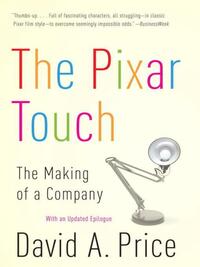You need to sign in or sign up before continuing.
Take a photo of a barcode or cover
Lots of insight into the creative and business aspects of Pixar.
I finally got around to reading this book. After all, I'm in it.
Overall it's a good read and a fairly accurate history of Pixar. I do need to note that there are some errors, though.
Most glaringly, Price got the idea that Jeff Mock's video interview with "Cosmic Don" Conway was with John Lasseter. When you read that little transcript that ends with, "May I shave your legs?" just know that it was Don talking, and not JL. Whoever made that transcript didn't know who was who.
Betty's prodigious assets in Knickknack were modeled by me, not an anonymous "TD who liked pinups". Yes, I enjoyed the SI Swimsuit Issue back in the day, but I was working from a design by JL.
And the book says that Steve Jobs was late to an office the day Pixar went public. He wasn't late: He was standing next to me (and a lot of other Pixar employees) in the screening room in Point Richmond. We watched the ticker go by on the screen and witnessed the moment Steve became a billionaire. It's probably the happiest I ever saw him look.
Again, totally worth reading if you're interested in Pixar's history.
Overall it's a good read and a fairly accurate history of Pixar. I do need to note that there are some errors, though.
Most glaringly, Price got the idea that Jeff Mock's video interview with "Cosmic Don" Conway was with John Lasseter. When you read that little transcript that ends with, "May I shave your legs?" just know that it was Don talking, and not JL. Whoever made that transcript didn't know who was who.
Betty's prodigious assets in Knickknack were modeled by me, not an anonymous "TD who liked pinups". Yes, I enjoyed the SI Swimsuit Issue back in the day, but I was working from a design by JL.
And the book says that Steve Jobs was late to an office the day Pixar went public. He wasn't late: He was standing next to me (and a lot of other Pixar employees) in the screening room in Point Richmond. We watched the ticker go by on the screen and witnessed the moment Steve became a billionaire. It's probably the happiest I ever saw him look.
Again, totally worth reading if you're interested in Pixar's history.
informative
inspiring
medium-paced
A very fun revisit to the nostalgic lineup of early Pixar movies. I'm particularly fortunate to have listened to this book immediately after The Men Who Would Be King, as the fates of all these familiar entertainment companies - Pixar, Dreamworks, and Disney - as well as of the unlikely feature of Steve Jobs, were intertwined.
There were a lot of parallels between Pixar and Dreamworks, but their promised potentials couldn't have been more opposite. Pixar's story felt like a story of an underdog. A team of unknown but talented inventor-animators trying to find the home for their company, as opposed to a team-up of Hollywood super stars who gathered billions of investments struggling to live up to their names.
Pixar Touch is also much nerdier and spent more time thinking about the technology behind making 3d animations, while The Men Who Would Be King felt like it explored the business part of Hollywood more - the marketing and especially their pursuit of academy awards.
Overall, I enjoyed Pixar Touch. I kind of wish it were longer and went deeper into the making of later films. It was also very interesting looking back at Pixar now that its brand has lost most of its strength with a series of mediocre products of recent memories. Their initial consecutive successes both in art and commerce, however, was undeniably nothing short of a miracle.
There were a lot of parallels between Pixar and Dreamworks, but their promised potentials couldn't have been more opposite. Pixar's story felt like a story of an underdog. A team of unknown but talented inventor-animators trying to find the home for their company, as opposed to a team-up of Hollywood super stars who gathered billions of investments struggling to live up to their names.
Pixar Touch is also much nerdier and spent more time thinking about the technology behind making 3d animations, while The Men Who Would Be King felt like it explored the business part of Hollywood more - the marketing and especially their pursuit of academy awards.
Overall, I enjoyed Pixar Touch. I kind of wish it were longer and went deeper into the making of later films. It was also very interesting looking back at Pixar now that its brand has lost most of its strength with a series of mediocre products of recent memories. Their initial consecutive successes both in art and commerce, however, was undeniably nothing short of a miracle.
Needs an update. Very academic in nature. Not as engrossing or entertaining as it could be. Maybe the distance of time would help give the material better perspective. Still it was a very interesting accounting on the origins of the world's premiere 3D animation company. I would recommend it to anyone who is a true fan of Pixar or animation.
For the past week, I’ve been watching all the Pixar movies in release order in preparation for their new movie Soul later this month.
Because of that, I decided to check this out as a similar way I’ve done the history of the Disney company.
I will say that this book is well written as it tracks Pixar’s history from its creation up to Ratatouille.
The first four chapters are a bit of a slog to get through since it’s mostly just on the technical and innovative side of computer animation, and after that it takes off in showing the studio politics of each movie as well as the love/hate relationship Steve Jobs had with Disney. Not as many big revelations in this like compared to Disney War, but still a good read that desperately needs an update either by the same writer or or from someone else.
Because of that, I decided to check this out as a similar way I’ve done the history of the Disney company.
I will say that this book is well written as it tracks Pixar’s history from its creation up to Ratatouille.
The first four chapters are a bit of a slog to get through since it’s mostly just on the technical and innovative side of computer animation, and after that it takes off in showing the studio politics of each movie as well as the love/hate relationship Steve Jobs had with Disney. Not as many big revelations in this like compared to Disney War, but still a good read that desperately needs an update either by the same writer or or from someone else.
informative
inspiring
lighthearted
medium-paced
funny
informative
medium-paced
Another great history of the Pixar company. Steve Jobs and John Lasseter have been such media stars in my reading over the years (having spent the 90s living in Silicon Valley and being an Apple and animation fan), so the most interesting parts to me are the sections dealing with founder Ed Catmull, who seems to have played an instrumental role in the development of almost every major computer graphics advance of the last half century. Engaging and conversational, the book doesn't spare anyone from the criticism of their peers, regardless of how many awards they won.
This was a suprisingly good read. It never got too technical, but it was fascinating to see where the company originated from and through who's hands it has passed. I honestly couldn't put it down, which, for the life of me, I cannot explain in any satisfactory way. I just really enjoyed it. Well written and worth the read, if you like Pixar.




